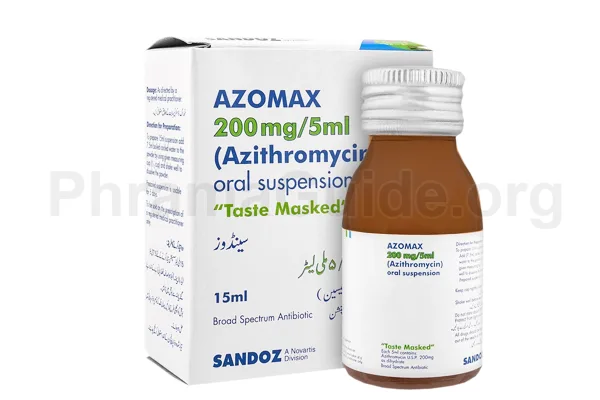Azomax syrup is a medication used to treat various bacterial infections including respiratory tract infections, and skin and soft tissue infections. It belongs to the class of antibiotics known as macrolides. Azomax syrup is mostly recommended for children and adults where a low dose of medicine is needed. The following are some common and off-label uses of Azomax Syrup:
Common Uses of Azomax Syrup
- Otitis Media: Azomax syrup may be used to treat bacterial infections of the middle ear, known as acute otitis media.
- Pharyngitis/Tonsillitis: It can be used to treat bacterial infections of the throat and tonsils, such as streptococcal pharyngitis.
- Community-Acquired Pneumonia: Azomax syrup is commonly used to treat bacterial pneumonia that is acquired outside of healthcare settings.
Sinusitis: Azomax syrup may be used for bacterial sinusitis, which is an infection of the sinuses. - Skin and Soft Tissue Infections: Azomax syrup is effective in treating certain skin and soft tissue infections caused by susceptible bacteria.
- Traveler’s Diarrhea: Azomax syrup may be used in the treatment of traveler’s diarrhea caused by specific bacterial pathogens. It can help reduce the duration and severity of symptoms associated with this condition.
Off-label Uses of Azomax Syrup
- Bronchiolitis: Azomax syrup may be used off-label in some cases of bronchiolitis, a viral infection that affects the lower respiratory tract in infants and young children. It is typically used in specific situations where there is a suspected or documented bacterial co-infection or in patients with certain risk factors.
- Asthma Exacerbations: In some cases, Azomax syrup may be used off-label as an adjunct therapy for asthma exacerbations, particularly in patients who may have evidence of bacterial infection or who do not respond to standard treatments alone.
- Cystic Fibrosis: Azomax syrup may be used off-label as a maintenance therapy in patients with cystic fibrosis to help reduce the frequency of respiratory exacerbations and improve lung function.
- Prevention of Exacerbations in Chronic Obstructive Pulmonary Disease (COPD): In certain situations, Azomax syrup may be used off-label to prevent exacerbations in patients with chronic obstructive pulmonary disease (COPD) who are at risk of frequent exacerbations.

What is Azomax?
Azomax Syrup is one of the leading brands of Azithromycin in oral liquid form, manufactured and marketed by Novartis, Pakistan.
Azomax Alternatives : Other Azithromycin Brands
Below are some available similar brands that can be used as an alternative to Azomax Syrup:
- Azitma : Sami Pharmaceuticals, Pakistan.
- Zetro : Getz Pharmaceuticals, Pakistan.
- Macrobac : Asian Continental Pharmaceuticals, Pakistan.
- Zyto : High-Q Pharmaceuticals (Pvt) Ltd, Pakistan.
- Azotek : Saffron Pharmaceuticals, Pakistan.
- Zezot : Bosch Pharmaceuticals, Pakistan.
- Zithromax : Pfizer Pharmaceuticals.
- Atizor : Macter International.
- Exthro : Indus Pharmaceuticals, Pakistan.
- Azitral : Nova Med Pharmaceuticals, Pakistan.
- Rescue : Standpharm Pakistan (Pvt) Ltd.
Azomax : Available Formulations and Strengths
Presently, Azomax is available in Syrup, Tablet, and Capsule forms.
Azomax Syrup : 200mg/5ml strength.
Azomax Tablet : 500mg strength.
Azomax Capsule : 250mg strength
Who Should Not Use Azomax?
Azomax syrup has certain contraindications, specific situations, or conditions in which the use of this medication is not recommended due to potential risks or adverse effects.
Hypersensitivity: Azomax syrup is contraindicated in individuals who have a known hypersensitivity or allergic reaction to Azomax or any other macrolide antibiotics, such as erythromycin or clarithromycin. Allergic reactions to Azomax can range from mild to severe and may include symptoms such as rash, itching, swelling, difficulty breathing, or anaphylaxis. If you have experienced an allergic reaction to Azomax or any macrolide antibiotics in the past, it is important to inform your healthcare professional.
Jaundice or Liver Dysfunction: Azomax syrup should be used with caution or avoided in individuals with a history of jaundice or liver dysfunction. The medication can affect liver function, and severe hepatotoxicity (liver damage) has been reported in rare cases. Your healthcare professional will assess the risks and benefits of using Azomax in such cases.
Severe Kidney Dysfunction: Azomax syrup is primarily eliminated from the body through the kidneys. Therefore, it is contraindicated in individuals with severe kidney dysfunction or end-stage renal disease. The use of Azomax in such cases may lead to an accumulation of the medication and potentially increase the risk of adverse effects.
QT Prolongation: Azomax has been associated with a risk of prolonging the QT interval on an electrocardiogram (ECG). It is contraindicated in individuals with a history of significant QT interval prolongation, arrhythmias, or with certain conditions that predispose to QT prolongation, such as electrolyte imbalances or certain heart conditions. Caution should also be exercised when using Azomax in combination with other medications known to prolong the QT interval.
Recommended Daily Dosage of Azomax Syrup
Azomax Syrup Dose for Respiratory Tract Infections:
- Otitis Media: 30 mg/kg as a one-time dose or 10 mg/kg once daily for three days.
- Pharyngitis/Tonsillitis: 12 mg/kg once daily for five days.
- Community-Acquired Pneumonia: 10 mg/kg once daily for three days.
Azomax Syrup Dose for Skin and Soft Tissue Infections:
- 10 mg/kg once daily for three days.
Azomax Syrup Dose for Sexually Transmitted Infections (STIs) like Chlamydia:
- 1 gram (1000 mg). This is typically administered as a one-time dose.
How Azomax Works?
Azomax’s mode of action involves inhibiting bacterial protein synthesis, which is essential for the growth and reproduction of bacteria.
Specifically, Azomax works by binding to the 50S ribosomal subunit of the bacterial ribosome. This binding prevents the ribosome from synthesizing new proteins, inhibiting bacterial protein production. By interfering with protein synthesis, Azomax disrupts the ability of bacteria to multiply and spread.
Related Links:

Leave A Comment